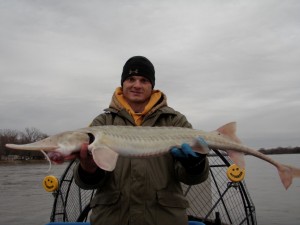
Marty Hamel, an Early Career Professional AFS member and active member of the Student and Early Career Subsection
“I’m proud to say that I am an AFS member as it is an integral component to my professional career. AFS has paid dividends for me as I have undertaken this journey as a fisheries biologist. My early involvement as a graduate student allowed me to network with fellow graduate students and fisheries professionals. Attending meetings and participating in the continuing education workshops provided insight into novel approaches that propelled my research to a new level. Meeting folks from around the country allowed me to begin collaborative work on larger-scale projects. After working in the profession for a few years, I began to participate at both the section and chapter levels. Contributing within committees assigned to specific tasks has provided a whole new level of professional development and has led me to assume leadership roles at various levels. To me, AFS is more than meetings and journal access. It is a tool for me to stay relevant in the fisheries field and I believe that all fisheries students and professionals would benefit from becoming a member.”
-Marty Hamel, Member since 2005
“AFS membership has been integral to my personal and professional development as a fisheries biologist. When I attended my first AFS annual meeting, I was terrified to talk to people, let alone present my undergraduate research! But, by the day of my talk, I had already met several professors and agency professionals, as well as students from other universities, and every single one that had said they would be at my talk was there. Rows of familiar faces, each with an encouraging smile. That’s what AFS is: support.
Annual meetings are just the beginning. Getting involved in specialized Sections, your Chapter and Division, and committees is satisfying, fun, and educational. AFS provides endless opportunities for finding colleagues with similar research interests, catching up on current research, collaborating with folks across political boundaries, and learning new facets of fisheries science. You can develop leadership, communication and teamwork skills through AFS involvement. Perhaps most importantly, you can develop lasting friendships and career-long partnerships with colleagues.”
– Rebecca Krogman, Member since 2008
Benefits of AFS Involvement
Becoming involved in AFS is a critical step in fisheries education and pays huge professional dividends to both students and early career professionals. It empowers students and early career professionals to develop professional competencies and cultivate relationships with scientists, managers, biologists, and policy makers throughout the world. Here are seven quick reasons to get involved:
- Contribute meaningfully to AFS
- Improve student and early career professional education and representation
- Establish and expand your professional network
- Gain leadership experience
- Acquire skills for employment and professional achievement
- Promote fisheries conservation
- Have fun!
As a member of AFS, it’s important for you to understand that there is a difference between the Society and its Units. Where the units work on a local or expertise level, the Society encompasses the whole she-bang and offers the greatest benefits. Only with a Society membership can you receive Fisheries magazine each month, have free access to all the journals, receive great discounts on AFS books, receive huge discounts on Annual Meeting registration, and more.
Students and early career professionals play a critical role in the American Fisheries Society, representing the next generation of fisheries professionals charged with conservation of aquatic ecosystems throughout the United States and the world. The path from fisheries student to professional is an exciting educational journey. It’s a time when students define their future and acquire critical skills for professional success.But navigating the educational roadmap is no easy task. We encourage AFS students and early career professionals to use the diverse resources at their disposal to live their professional dreams.
How do I get involved?
Students and early career professionals can get involved in the AFS in many ways:
- Write – Whether it’s original research, popular literature, or a “Student Angle” article in Fisheries, publishing your writing is a phenomenal way to get involved in the AFS. Publications are the currency of science and a gateway to employment. Talk with your faculty advisor and fellow students about ways to get your writing published.
- Engage with the Student and Early Career Professional Subsection of the Education Section – The Subsection is an association of AFS students and early career professionals throughout the United States and Canada. Members work closely with the Education Section to improve fisheries education and foster communication among fisheries educators, employers, students, and the public.
- Get active in a Student Subunit – Many universities with fisheries programs have Student Subunits of the American Fisheries Society. Subunits are operated by officers (e.g., President, Vice President, Secretary, Treasurer) and work to promote fisheries conservation, professional development of members, and public education. Talk with your faculty advisor and fellow students about getting involved.
- Connect with your state chapter – Many states have a chapter of the AFS. Students give professional talks and poster presentations, run for officer positions, organize raffles and silent auctions, and write newsletters. Talk with your state chapter representative about getting involved.
- Volunteer at AFS meetings – At Annual Meetings of the AFS, students and early career professionals can assist with registration, event planning, professional presentation judging, and other tasks. Check the AFS website and look for emails from the Student Activities Committee prior to the Annual Meeting for more information.


